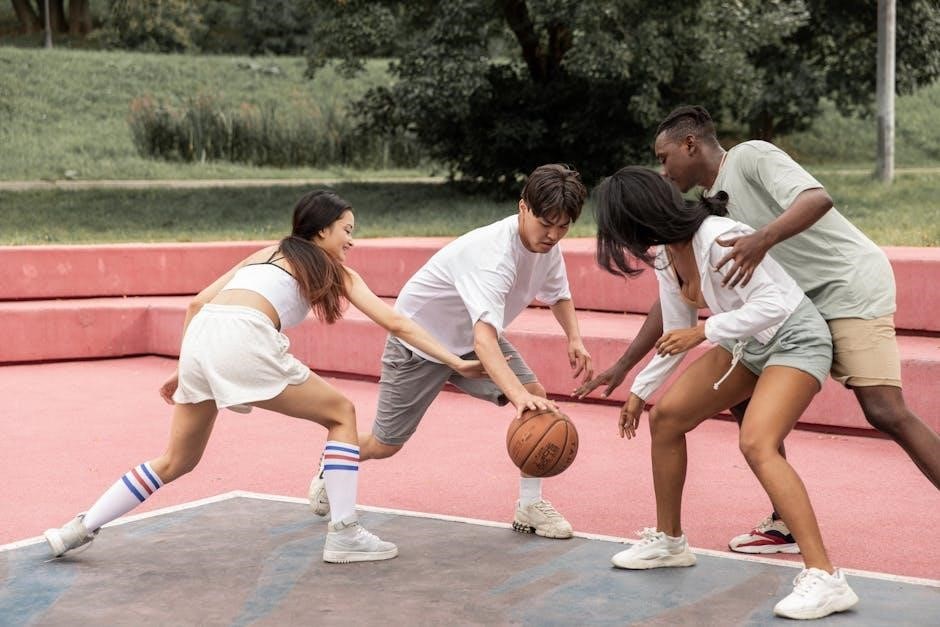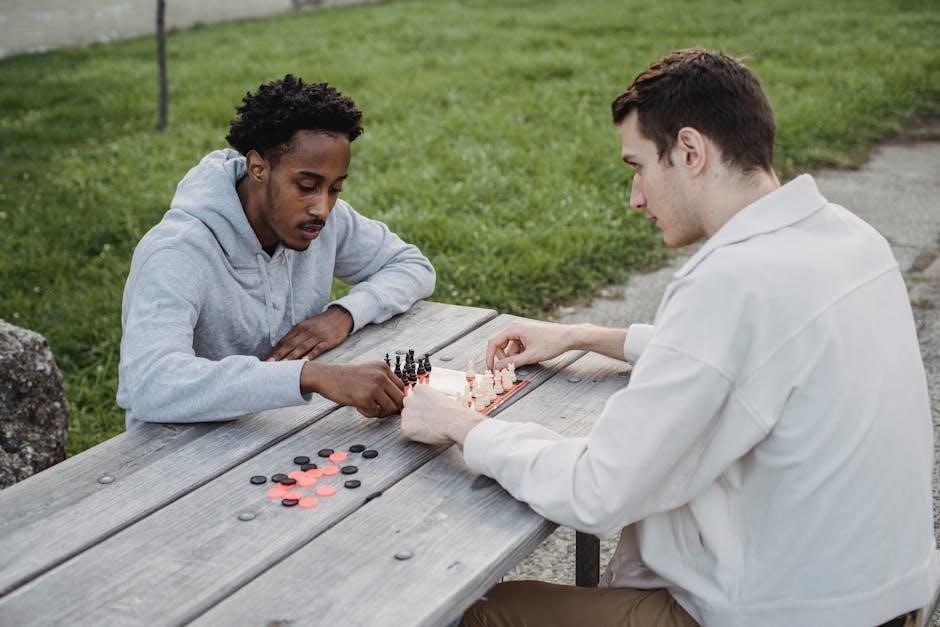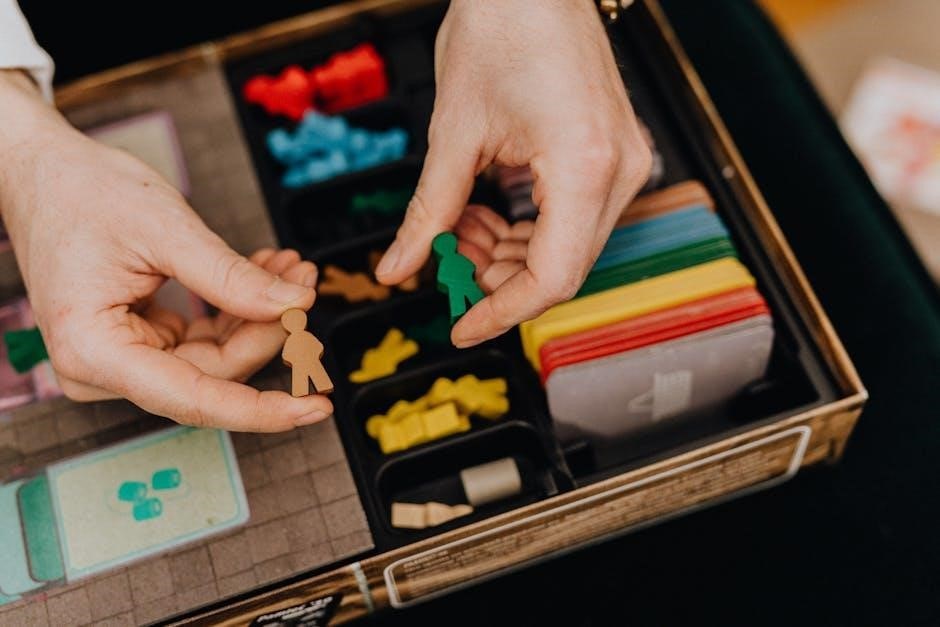Social skills worksheets are practical tools designed to enhance interpersonal abilities. Available as downloadable PDFs, they cater to children, teens, and adults, focusing on listening, communication, and conflict resolution.
These resources provide structured exercises to improve social behavior and emotional intelligence, helping individuals navigate daily interactions more effectively.

1.1 What Are Social Skills Worksheets?
Social skills worksheets are educational resources designed to help individuals develop and refine their interpersonal abilities. Available as downloadable PDFs, these tools typically include structured exercises, activities, and prompts that guide users in understanding and improving their social interactions. They often focus on specific skills like communication, empathy, and conflict resolution. Worksheets may incorporate role-playing scenarios, discussion topics, and reflective exercises to encourage practical application. Designed for various age groups, including children, teens, and adults, these resources are widely used by educators, therapists, and parents to foster social competence and emotional intelligence in both personal and professional settings.
1.2 Importance of Social Skills in Daily Life
Social skills are essential for building strong relationships, effective communication, and personal growth. They influence how individuals perceive and interact with others, shaping experiences in both personal and professional settings. Strong social skills enhance collaboration, empathy, and conflict resolution, fostering a positive environment. They also play a critical role in mental health, as good interpersonal abilities reduce stress and improve emotional well-being. Developing these skills helps individuals navigate social situations confidently, leading to better opportunities and a higher quality of life; Cultivating social competence is vital for adapting to diverse environments and achieving long-term success.

Social Skills Worksheets for Different Age Groups

Social skills worksheets are tailored for children, teens, and adults, offering age-appropriate activities to enhance emotional intelligence and foster positive social interactions in diverse settings.
2.1 Worksheets for Children
Worksheets for children focus on foundational social skills like sharing, taking turns, and cooperation. Activities such as “My Turn Your Turn” and “Sharing Space” help kids practice teamwork and empathy. Color-by-code exercises and simple games make learning interactive and fun. These resources also include exercises on recognizing emotions and understanding social cues, fostering emotional intelligence from an early age. Group activities encourage collaboration, while individual tasks promote self-reflection. Parents and educators can use these tools to create a supportive environment for children to develop essential social behaviors and build confidence in their interactions with peers and adults;
2.2 Worksheets for Teens and Adolescents
Worksheets for teens focus on advanced social skills like communication, conflict resolution, and self-awareness. They often include exercises on active listening, interpreting social cues, and managing emotions. Activities such as role-playing scenarios and group discussions help teens practice navigating complex social dynamics. These resources also address topics like peer pressure, empathy, and building healthy relationships. Designed to align with adolescent developmental needs, they encourage self-reflection and confidence-building. By addressing real-life challenges, these worksheets empower teens to develop the skills necessary for meaningful interactions and long-term personal growth in their social and emotional lives.
2.3 Worksheets for Adults
Social skills worksheets for adults focus on refining communication, emotional intelligence, and workplace interactions. Designed for personal or professional growth, they often include exercises on active listening, conflict resolution, and self-awareness. These resources address topics like networking, assertiveness, and building rapport. Many worksheets incorporate self-assessment tools to help adults identify strengths and areas for improvement. Practical exercises and real-life scenarios enable adults to apply skills in everyday situations, fostering confidence and stronger relationships. Whether for personal development or career advancement, these worksheets provide a structured approach to enhancing social competence and emotional intelligence in adulthood.

Key Components of Effective Social Skills Worksheets
Effective social skills worksheets include exercises for listening, communication, and conflict resolution. They often incorporate self-assessment tools and real-life scenarios to enhance emotional intelligence and interpersonal abilities.
3.1 Listening Skills
Listening skills are a cornerstone of effective social interaction. Worksheets often include exercises like “Look, Listen, and Respond” to help individuals focus on others’ messages.
Activities such as identifying non-verbal cues and paraphrasing statements enhance understanding and empathy. These tools encourage active listening, reducing misunderstandings and fostering meaningful connections.
By practicing these exercises, individuals improve their ability to engage fully in conversations, leading to stronger relationships and better communication overall.
3.2 Communication Skills

Communication skills are vital for expressing ideas and building connections. Worksheets often include exercises like role-playing and identifying non-verbal cues to enhance clarity and respect in interactions.
Activities focus on practicing verbal and non-verbal communication, such as using “I” statements or interpreting facial expressions. These tools help individuals articulate their thoughts effectively and respond appropriately to others.
By improving these skills, individuals can navigate conversations with confidence, fostering understanding and collaboration in both personal and professional settings.
3.3 Conflict Resolution
Social skills worksheets often include exercises to teach effective conflict resolution. These tools help individuals identify and manage disagreements constructively. Activities may involve role-playing scenarios, identifying emotions, and practicing resolution strategies.
Worksheets encourage active listening, empathy, and clear communication to address conflicts fairly. They also provide step-by-step guides for resolving disputes, fostering mutual respect and cooperation.
By mastering these skills, individuals can navigate challenging situations confidently, promoting positive outcomes and stronger relationships in personal and professional environments.
How to Use Social Skills Worksheets
Use social skills worksheets by following step-by-step guides for parents and educators. Incorporate them into daily routines, starting with identifying emotions and role-playing scenarios.
These structured exercises help individuals practice effective communication and conflict resolution, fostering personal growth and improved interactions in various settings.

4.1 Step-by-Step Guide for Parents and Educators
Begin by identifying the individual’s social skill needs. Select appropriate worksheets, such as those focused on listening or communication.
Demonstrate activities like role-playing or group discussions to model behaviors.
Provide clear instructions and examples from the worksheet.
Encourage practice through guided exercises, offering constructive feedback.
Reinforce learning by repeating activities and discussing progress.
Use downloadable PDF worksheets for convenience and accessibility.
This structured approach helps parents and educators effectively teach and reinforce social skills in a supportive environment.

4.2 Incorporating Worksheets into Daily Routines
Start by assigning specific times for social skills practice, such as during homework sessions or before activities. Use downloadable PDF worksheets to create a structured routine.
For children, integrate short exercises on sharing space or taking turns. For teens, focus on communication drills like active listening or conflict resolution.
Involve the individual in selecting topics to maintain engagement. Encourage practical application through role-playing or group discussions.
Use visual aids and positive reinforcement to support learning. Track progress and celebrate achievements to motivate continued growth.
Consistency and adaptability are key to making social skills worksheets a meaningful part of daily life.
Benefits of Using Social Skills Worksheets
Social skills worksheets enhance interpersonal relationships, boost self-confidence, and improve emotional intelligence. They provide structured exercises to develop essential life skills, fostering personal and professional growth effectively.
5.1 Improved Interpersonal Relationships
Social skills worksheets foster healthier and more meaningful connections by teaching effective communication and empathy. These tools help individuals understand and navigate group dynamics, fostering cooperation and mutual respect. By practicing active listening and conflict resolution, users develop the ability to express needs clearly while respecting others’ perspectives. Worksheets often include exercises on non-verbal cues, such as body language and facial expressions, which are crucial for building trust. Regular use of these resources enhances collaboration and reduces misunderstandings, leading to stronger, more harmonious relationships in both personal and professional settings. This, in turn, creates a supportive environment for social growth and understanding.
5.2 Enhanced Self-Confidence
Social skills worksheets play a significant role in boosting self-confidence by equipping individuals with practical tools to navigate interactions effectively. Through structured exercises, users gain clarity in expressing their thoughts and feelings, reducing anxiety in social situations. Worksheets focused on communication and active listening help build a sense of control and competence. Regular practice fosters self-assurance, enabling individuals to approach conversations and relationships with greater ease and positivity. This empowerment leads to improved self-perception and a stronger belief in their ability to connect meaningfully with others.
5.3 Better Emotional Intelligence
Social skills worksheets contribute to better emotional intelligence by teaching individuals to recognize, understand, and manage emotions in themselves and others. These resources often include exercises that focus on identifying emotional cues, empathizing with others, and developing self-awareness. By practicing these skills, users gain a deeper understanding of social dynamics and improve their ability to navigate complex interpersonal situations. Enhanced emotional intelligence fosters healthier relationships, reduces conflict, and promotes a more positive outlook on social interactions. These tools empower individuals to communicate more effectively and respond thoughtfully to emotional challenges.
